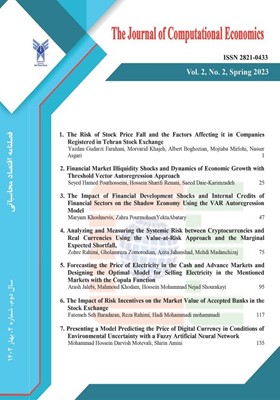The Impact of Financial Development Shocks and Domestic Credit of Financial Sectors on the Shadow Economy Using the Vector Autoregression (VAR) Model
Subject Areas : Computational economicsZahra Pour Mohsen Yekta Abatari 1 * , maryam khoshnevis 2
1 - Master, Department of Financial Management, Semnan Branch, Islamic Azad University, Semnan, Iran.
2 - Assistant Professor and Faculty Member, Department of Economic Sciences, Semnan Branch, Islamic Azad University, Semnan, Iran. (Corresponding Author)
Keywords: Financial Development, Shadow Economy, creditprivate, Panel vector autoregression,
Abstract :
There is a lot of evidence today that informal economic activities are growing in the world, and therefore Study of shadow economy, as one of the main components in orienting and defining economic policies, has always been a concern for economists, but in this field, the impact of development of financial markets and internal credits on the volume of the shadow economy has been dealt in less.Development of financial markets play a considerable role in providing required credit to entrepreneurs and business corporations so they impress shaping economic activities and continual of economic transactions. This research aims in investigating the effects of shocks in financial development and domestic credit on the shadow economy, conducted using the VAR auto-regression model for country (Iran) from 1372 to 1395 (1993 to 2016). Instantaneous response functions and variance analysis shows the effect of bank credit shocks on the shadow economy. The analysis of the results suggests that financial development, the ratio of private sector domestic credit to GDP and the ratio of financial sector domestic credit to GDP in studied years, impose a long time negative and significant effect on the country shadow economy.
_||_

